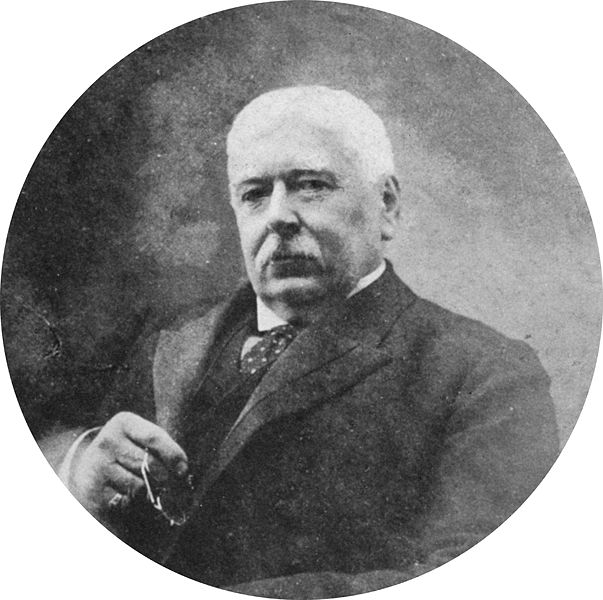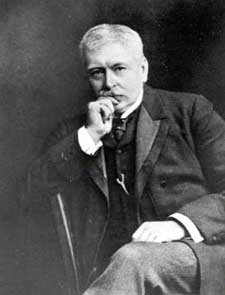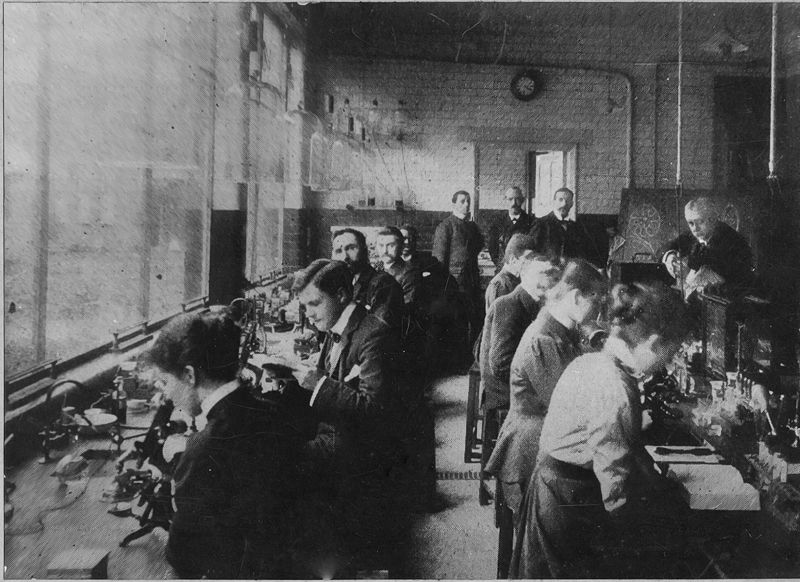<Back to Index>
- Physician Sir Patrick Manson, 1844
- Painter Henry Lerolle, 1848
- Cherokee Chief John Ross, 1790


Sir Patrick Manson (3 October 1844 in Oldmeldrum, Aberdeenshire - 9 April 1922 in London) was a Scottish physician who made important discoveries in parasitology and was the founder of the tropical medicine field.
He was the second son of John Manson and Elizabeth née Blakie. He obtained the Bachelor of Medicine at the University of Aberdeen in 1865, his Master of Surgery in 1866 and his Medical Doctorate and Doctor of Law in 1866. Manson traveled to Formosa (Taiwan)
in 1866 as a medical officer to the Chinese Imperial Maritime Customs,
where he started a lifelong career in the research of tropical
medicine. After 5 years in Formosa (Taiwan), he transferred to Amoy, on
the Chinese coast where he worked for another 13 years. Between 1883 and 1889 he practised medicine in Hong Kong. He spent his early years researching Filaria (a small worm that causes elephantiasis).
Manson focused his time on searching for Filaria in blood taken from
his patients. From this he began to work out the life cycle of Filaria
and through painstaking observation discovered that the worms were only
present in the blood during the night and were absent during the day.
He used to conduct experiments on his gardener, Hin Lo, who was
infected with the Filaria. He would get mosquitoes to feed on his blood
while he slept and then dissect the mosquitoes filled with Hin Lo's
blood. “I shall not
easily forget the first mosquito I dissected. I tore off its abdomen
and succeeded in expressing the blood the stomach contained. Placing
this under the microscope, I was gratified to find that, so far from
killing the Filaria, the digestive juices of the mosquito seemed to
have stimulated it to fresh activity.” Manson observed that the
Filaria only developed as far as an embryo within the human blood and
that the mosquito must have a role in the life cycle of the Filaria.
Through these early experiments he started to hypothesise about the
role of mosquitoes and the spread of disease. Out of this arose the
mosquito malaria theory, which suggested that the agent that causes malaria was
also spread by a mosquito. This discovery was one of the most important
medical breakthroughs of the time. Under the constant supervision of
Manson, Sir Ronald Ross described
the full life cycle of the plasmodium inside the female mosquito.
Manson's theory was finally proved by Ross in 1898, who later won the
Nobel Prize in 1902 for this discovery. Manson also demonstrated a new
species of Schistosoma (Bilharzia) known as Schistosoma mansoni. He was the first to import cows from his native Scotland to Hong Kong and thus establish a dairy farm in Pok Fu Lam in 1885 and the company Dairy Farm in Hong Kong. He was the founder of the Hong Kong College of Medicine for Chinese, where Sun Yat-sen was
one of his first pupils. In 1896, through his contacts at the Foreign
Office, Manson managed to secure the release of Sun after he had been
kidnapped in London by Chinese officials. Sun went on to become the
first President of the Republic of China. In 1911 Hong Kong College of Medicine for Chinese became the University of Hong Kong.
He returned to London in 1889 and in 1897 Manson was appointed as Chief
Medical Officer to the Colonial Office. It was here that he used his
influence to push for the foundation of a School of Tropical Medicine
at the Albert Dock Seamen's Hospital. The London School of Hygiene & Tropical Medicine was opened on 2nd October 1899. He was elected to the Royal Society in 1900, knighted in 1903 and in the following year awarded an honorary Doctorate of Science by the University of Oxford. He became the first president of the Royal Society of Tropical Medicine in 1907. He retired from the Colonial Office in 1912.
Manson
married in 1876 to Henrietta Isabella Thurbun, with whom he had three
sons and one daughter. His daughter married Philip Heinrich Bahr, one
of Manson's pupils at the London School of Tropical medicine. Sir
Philip Manson-Bahr CMG DSO MD FRCP (Lond) became a leader in the field
of tropical medicine in
his own right. In 1995 Manson's grandson, Dr Clinton Manson-Bahr won
the Manson medal which is awarded triennially. It is the Royal Society
of Tropical Medicine's highest mark of distinction for contributions to tropical medicine.
